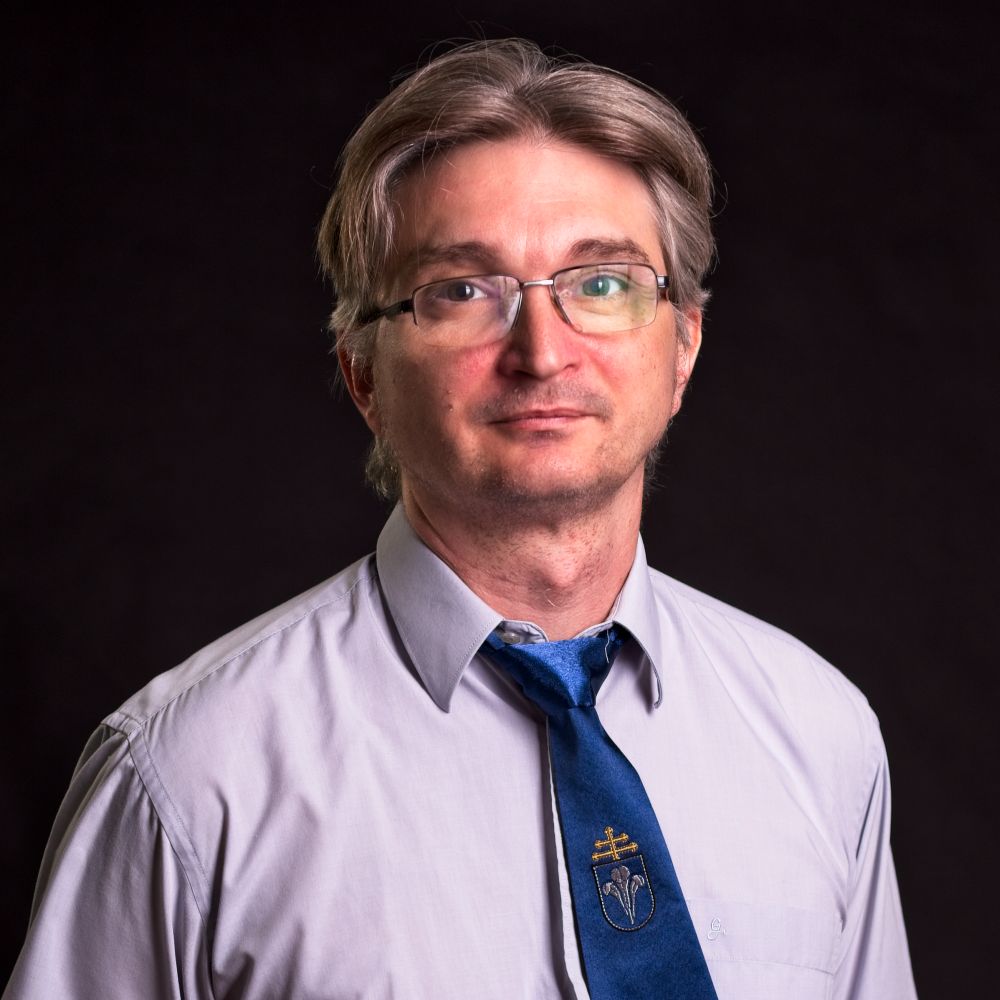
INNOVATION
BASED ON
BIOLOGICAL DATA
Bioinformatics MSc
Application deadline
20 May 2025, 11.59 pm CET
(Central European Time)
Discover the Secrets of Biology with IT Tools
Bioinformatics is a science at the intersection of computer science and life sciences. By processing ever-increasing amounts of biological data, bioinformatics transforms data into information, paving the way for further scientific discoveries.
Bioinformatics knowledge is indispensable in all areas of biotechnology, including personalised medicine, drug and vaccine development, and database and software development for biomedical data.
Get Ahead in Your Career
As the healthcare, biotechnology, and pharmaceutical industries rely more and more on data analytics and artificial intelligence, the demand for professionals with biological knowledge and programming/analysis skills is growing. Market analysts* estimate a compound annual growth rate (CAGR) of 13.0% for the bioinformatics sector, supporting the need for people with complex skills.
The Bioinformatics MSc at Pázmány ITK will prepare you to find your place in this dynamically growing market with its ever-new discoveries.
*https://www.marketsandmarkets.com/Market-Reports/bioinformatics-39.html
KEY FOCUS AREAS
Sequence Analysis
Structural Biology
Bioinformatics
Algorithms
Biostatistics
Molecular Diagnostic Data Processing Techniques
Systems Biology Modelling Techniques
Mathematical Description of Complex Systems
Modelling of Neurobiological Processes
Rendszer-biológiai modellezési eljárások
Komplex rendszerek matematikai leírása
Neurobiológiai folyamatok modellezése
Specializations
During the last decade, next-generation sequencing (NGS) methods ignited a profound transformation in personalized medicine by providing an affordable and efficient diagnostic background. Today’s trends include single-cell analysis techniques allowing the investigation of tissue heterogeneity, including tumors. In addition, novel high-throughput techniques are joining NGS in the areas of 3D protein structure prediction, proteomics, metabolomics analysis, etc. Interpreting the results obtained by these investigations is key in today’s molecular biology and medicine and is expected to become even more important.
Our specialization in Biomolecular data interpretation offers courses in a wide range of data processing and analysis. Besides NGS, functional analysis of DNA and protein sequences, proteomics studies and macromolecular modeling appear as key aspects in understanding and influencing molecular processes.
Quantitative analysis of large data sets can be performed using systems biology approaches. Such models can describe biological processes by considering molecule interactions and provide testable predictions. There are already efforts to use systems biology in biomedical applications, e.g. to predict the effect of potential drugs and to select molecular targets for a prospective therapy. With appropriate models, the complexity of the human nervous system can also be understood in more detail. Of course, systems biology utilizes the plethora of molecular and cellular-level data, incorporating them into specialized mathematical models.
At our Systems Biology specialization, we provide detailed mathematical and computational background, including the description of nonlinear systems and parameter estimation. We also introduce the data types and cellular processes relevant to systems biology models and give a comprehensive overview of current and prospective applications. We also offer specialized courses, e.g. with a focus on neurobiological modeling.
Lecturers

Zoltán Gáspári
professor
Biologist, protein structure researcher. His research experience extends to various fields of bioinformatics, and he is experienced in method development and data analysis. He regularly publishes as the last author in interdisciplinary, molecular biological, and bioinformatics profiled journals. He serves as a regular reviewer for PhD theses and domestic and international grant applications. Currently, he is a member of the Presidency of the Hungarian Bioinformatics Society.

Attila Csikász-Nagy
professor
With his extensive experience in systems biology, he is an internationally recognized researcher in the regulation of the cell cycle and circadian rhythm. He has more than a decade of experience in foreign teaching and research. He regularly publishes in reputable journals in his field. Currently, he represents the Budapest region in the Hungarian Biochemical Society.

János Juhász
Assistant professor
Being a certified bioinformatician and a member of the Pázmány ITK Bioinformatics and Systems Biology research groups, his research focuses on the bioinformatical and statistical analysis and computer modeling of microbial communities. He is involved in teaching bioinformatics, biostatistics, and computer biology courses.

Balázs Ligeti
research fellow
Head of the Pázmány ITK Neural Bioinformatics research group, an expert in molecular data processing. His research area includes the development of large-scale genomic language models and sequence representations, along with algorithms built upon them.
Main Subjects
Natural Sciences, Biology (20-30 credits)
The course aims to provide advanced knowledge in the following subjects: – synthetic cellular regulatory networks |
Metric spaces, Normed spaces, Inner product spaces. Basic: sequence- and function spaces. The topology of metric spaces. Open, closed, and compact sets. Completeness. Measure and integration. Riemann and Lebesue integral. Lebesgue Lp spaces. Fourier analysis in Hilbert space. An introduction to Abstract linear operator theory.
The course will cover quantitative approaches to biological problems in cell, molecular, and evolutionary biology. All scientists giving lectures are actively performing experiments as well as analyzing data. So, the specificity of the course is on the analysis of quantitative experimental data in biology. In particular, scientists from different European institutions will address single-cell analyses, the use of microfluidics, long-term evolution experiments, the dynamics of COVID-19, mechanisms of cell motion, and others.
The course offers a concise overview of the cell’s dynamic metabolic networks, focusing on the general principles of enzyme kinetics, structure, and control of metabolic pathways. Aspects are essential for future specialists in Biotechnology are emphasized: modern biochemical techniques in the characterization of intermolecular interactions and enzyme action and in silico modelling of biochemical processes and systems. Medical orientation is implemented with a discussion of the molecular basis of selected diseases with significant public health impact (cardiovascular, neurodegenerative disorders), focusing on the molecular targets of therapy. Students participate in formal lectures, tutorials, and computer-simulated practical lessons. |
The course aims to introduce the laboratory techniques necessary to maintain and investigate cell cultures and use them as model systems tools to address specific scientific questions. The course emphasizes culturing bacterial cells for protein production and the maintenance of yeast strains and mammalian cell lines, including tumor cells. After an overview of the fundamental techniques and protocols, the specific aspects of different cell culture-based experiments and cell analysis techniques are discussed. |
Chemical aspects of biological processes. Proteins and biopolymers, posttranslational modifications. Intrinsically disordered proteins. Chemical aspects of protein synthesis in the laboratory and the cell. Internal dynamics of proteins and their significance, basic concepts in protein NMR spectroscopy. Chromatin organization and introduction to epigenetics. RNA-based regulation processes. Chemical biology of vesicle transport and cell division.
Principles of signal transduction
The cAMP mediator system
Signalling pathways utilizing phosphoinositides
Receptor tyrosine kinases
Signal transduction of insulin and diabetes mellitus
Signalling pathways of NF-kappaB and TGF-beta
Signalling pathways of cytokines
Signal transduction to and from adhesion molecules
Regulation of cell cycle
The biochemistry of programmed cell death
Molecular mechanisms of tumour formation.
Broad sense stationary processes, Orthogonal processes and their transformations, Prediction, innovation and the Wold decomposition, Singular processes, Spectral theory, Random orthogonal measures, Representation of a broad sense stationary process, AR, MA and ARMA processes, Multivariate time series, State-space representation, Kalman filtering, Identification of AR processes, Identification of MA and ARMA models, Non-stationary models, Stochastic volatility: ARCH and GARCH models. |
Programming and Data Analysis (20-40 credits)
Presenting measured data and complex results emerges as a specific new problem in the life sciences. How can we design effective pictures from our numeric or textual data? How can we compact millions of data points into a pattern or trend presentable in a single image? This class focuses on biological sequences, genomes, clinical data, metagenomes, gene expressions, molecular 3D data, and (brain) networks, also touching small molecules such as pharmacons. The goal is to give students knowledge that enables them to choose the right tools and to get acquainted with their advantages and disadvantages. |
Artificial intelligence combined with deep learning is one of the most rapidly developing areas in computer science. On the other hand, optimization methods used, e.g., the gradient method, have been well-known for decades. Still, the theoretical background of this discipline is not well explored. This course will introduce some classical optimization methods and highlight their relevance in artificial intelligence.
The course will show practical aspects of machine learning-based approaches in biotechnology and medical technology. Topics include the detection of functional motifs in large sequence sets, genome-wide association analysis, analysis of biological networks, including metabolic pathways and neural connections, and processing neural signals and medical images. Emphasis will be put on the proper formulation of the problems, practical steps in data analysis, including training and test data sets, and the critical evaluation of the results.
This course covers the fundamentals of data mining:
1. Input and output of data mining process.
2. Task types (e.g., clustering, classification, numeric prediction, association rule mining).
3. Evaluation
4. Selected algorithms
5. Preprocessing and postprocessing
6. Ensemble learning methods
| Data description, reduction, representation: Decision theory: Z-score, confidence intervals, CLT, hypothesis testing, significance level, p-value, type I-II errors, power, effect size, sample size, Cohen’s d Study design Normality tests; Data transformations: log, logit; Parametric tests Nonparametric tests Khi-square test, Fisher-test; Classification: ROC curve Correlation, confoundings Regression: linear, simple, multiple, logistic Survival analysis: life-table, Kaplan-Maier method, Cox model |
Problem and program.
Methods and tools for specification.
Program description tools and methods.
Significance and levels of abstraction.
Abstract data types.
Programming theorems and their application.
Program transformations.
Algorithm correctness, proving techniques
|
Economic and Human Sciences (5-10 credits)
The direct goal of the course is to create the foundations of an innovation ecosystem that helps the market translation of research in subject areas close to the Faculty, thus helping PPKE-ITK students and researchers to work on their innovative ideas in an inspiring environment in which they can – sustainably and motivated – develop their creativity and acquire the business and soft skills that are most necessary for success in today’s competitive world of startup companies that catalyze technology development.
In this course, students will learn about the concept and role of projects, the life cycle of projects, and the concept of success. Throughout the semester, the course will pay particular attention to the roles and choices available, helping students make more informed decisions in their future careers. The main project support procedures, the applied methodologies for IT development projects, and the areas (financial, legal, marketing, etc.) that affect project implementation will be discussed. The elements of controlling, resourcing, planning, and financing will be presented, as well as the role of quality assurance. At the end of the course, case studies will be used to demonstrate the knowledge acquired. |
The course aims to familiarize students with the toolbox of intellectual property rights that can be used in their field of expertise (bionics, biotechnology) at a basic level to prepare them so that, as professionals working in research and development, they can work with the process of innovation and the protection of their intellectual creations in mind, and to take the steps expected of a researcher to make it possible to utilize the results of innovation, they should be able to cooperate with professionals working in this economic and legal field.
Thesis Work (30 credits)
This course offers the opportunity to work for 3 semesters on a specific problem in faculty laboratories or in research groups in collaborating institutions.